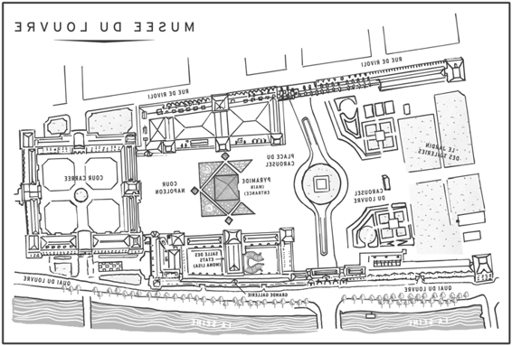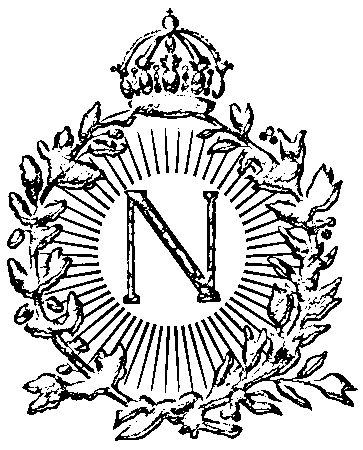The Gilded Seal (2 page)

This novel was inspired by the theft of the
Mona Lisa
in 1911
and its eventual recovery in 1913, an event which triggered
one of the largest criminal investigations in history and to
which the
Mona Lisa
owes much of her present-day fame.
All descriptions and background information provided on
works of art, artists, thefts, forgery detection techniques and
architecture are similarly accurate. Unfortunately, the Clare-
mont Riding Academy, which is briefly featured in this novel,
announced its closure shortly before publication, but the de-
scription was left unchanged as a tribute to the sad passing of
a much loved New York landmark.
For more information on the author and on the fascinat-
ing history, people, places and artifacts that feature in
The Gilded Seal
and the other Tom Kirk novels, please visit
www.jamestwining .com.

Extract from
Lives of the Most Eminent
Paint ers, Sculptors, and Architects
by Giorgio
Vasari (1568), translated by Gaston du C. de
Vere (1912)
Leonardo undertook to execute, for Francesco del
Giocondo, the portrait of Mona Lisa, his wife.
In this head, whoever wished to see how
closely art could imitate nature, was able to
comprehend it with ease; for in it were counter-
feited all the minutenesses that with subtlety are
able to be painted . . .
. . .
The nose, with its beautiful nostrils, rosy
and tender, appeared to be alive. The mouth,
with its opening, and with its ends united by the
red of the lips to the flesh-tints of the face,
seemed, in truth, to be not colors but flesh. In the
pit of the throat, if one gazed upon it intently,
could be seen the beating of the pulse. And, in-
deed, it may be said that it was painted in such a
manner as to make every valiant craftsman, be
he who he may, tremble and lose heart.
And in this work of Leonardo’s there was a
smile so pleasing, that it was a thing more
divine than human to behold; and it was held to
be something marvelous, since the reality was
not more alive.
2 j a m e s
t w i n i n g
The Washington Post
, 13th December 1913
Mona Lisa,
Leonardo da Vinci’s great painting,
which was stolen from the Louvre, in Paris, more
than two years ago, has been found [and a man
arrested]. It is now in the hands of the Italian
authorities and will be returned to France.
Mona Lisa
or
La Joconde
as it is more prop-
erly known, the most celebrated portrait of a
woman ever painted, has been the object of an
exhaustive search in all quarters of the globe.
The mystery of its abstraction from the Louvre,
its great intrinsic value, and the fascination of
the smile of the woman it portrayed . . . have
combined to keep alive interest in its recovery.
On being interrogated, the prisoner said his
real name is Vincenzo Peruggia . . . “I was
ashamed,” he said “that for more than a century
no Italian had thought of avenging the spolia-
tion committed by Frenchmen under Napoléon
when they carried off from the Italian museums
and galleries, pictures, statues and treasures of
all kinds by wagonloads, ancient manuscripts by
thousands, and gold by sacks.”

There is only one step
from the sublime to the ridiculous.
Napoléon I
MACARENA, SEVILLE, SPAIN
14th April (Holy Thursday)— 2:37 a.m.
It started with a whisper; a barely voiced tremor of sup-
pressed anticipation that rippled gently through the expec-
tant crowd.
“
Pronto. Pronto estará aquí
.” Soon. She’ll be here soon.
But the whisper evaporated almost as quickly as it had ap-
peared. Snatched from their lips by a capricious wind, it was
carried far above their heads into the warm night, only to be
casually tossed between the swirling currents like autumn
leaves being chased across a park.
It was replaced, instead, by the distant sound of a lone
trumpet, its plaintive, almost feminine cry echoing down the
winding, cobbled street. This time, people made no attempt
to conceal their excitement, and their faces flushed with a
strange inner glow.
“Ahora viene. Viene La Macarena.”
She’s coming. La Maca-
rena is coming.
The crowd, almost ten deep on both sides of the street,
surged forward against the steel barriers that lined the route,
straining to see. In between them, the dark cobblestones
fl owed like a black river, their rippled surface glinting occa-
sionally in the fl ickering light.
6 j a m e s
t w i n i n g
The man allowed himself to be carried forward by the
breathless host, sheltering in the warm comfort of the ano-
nymity they provided. In the crowd, but not of it, his eyes
skipped nervously over the faces of those around him rather
than the approaching procession. Had he lost them? Surely
they couldn’t find him now.
He caught his own reflection in the polished rim of a lan-
tern being carried by a woman in front of him. His leathered
skin, dark eyes glowing like hot coals, the steep cliff of his
jaw, the ruby-colored razor slash of his lips, his wild mane of
white hair. The unmistakable mask of despair. He had a
sudden vision of an aging lion, standing on some high prom-
ontory, taking one last look at his territory stretching toward
the horizon and at his pride, lazing beneath him in the setting
sun’s orange-fingered embrace, before heading quietly into
the bush to die.
A cheer drew his gaze. The fi rst
nazarenos
had swung into
view. Sinister in their matching purple cloaks and long
pointed hats, they trooped silently past, their faces masked
with only narrow slits for eyes, a black candle grasped sol-
emnly in one hand. Behind them, a marching band dictated a
steady pace.
“¡Está aquí! ¡Está aquí!”
She’s here! She’s here! A small
boy with long golden hair had fought his way through to where
he was standing and was jumping to try and get a better look.
The man smiled at his eagerness, at his uncomplicated and
breathless excitement and, for a moment, forgot his fear.
“Todavía no. ¿Ves?”
Not yet. See? He swept the boy off
the ground and lifted him above his shoulders to show him
how far the procession still had to run before the solid silver
float containing the statue of the Virgen de la Esperanza
Macarena would appear.
“Gracias, Señor.”
The boy gave him a faint kiss on the
cheek before diving through the legs of the people in front
with a snatched wave.
The fi rst fl ower-strewn fl oat shuffled past—the sentencing
of Christ by Pontius Pilate. The faint aroma of incense and
orange blossom drifted to him on a mournful sigh of wind
and he breathed in deeply, the smells blending harmoniously
t h e g i l d e d s e a l
7
at the back of his throat like cognac fumes. How had it come
to this? It had all happened so long ago now. Forgotten.
He looked back to the procession and saw that the
nazarenos
had given way, temporarily at least, to two rows of
penitentes—
those who sought to repent of their sins by walking the pro-
cessional route barefoot and with heavy wooden crosses slung
over their shoulders. He smiled ruefully at the sight of their
bruised and bloodied feet, part of him wanting to take his
place alongside them, the other knowing it was too late.
A sudden break in their somber ranks afforded him a clear
view right through to the other side of the street. There sev-
eral
monaguillos
, children dressed as priests, were handing
out sweets to the people standing in the front row. They were
all smiling, the peal of their laughter filling the air. All apart
from one man who, his phone pressed to his ear, was staring
straight at him.
“They’re here,” he breathed. “They’ve found me.”
He turned away, instinctively heading against the fl ow of
the procession to make it harder for anyone to follow him.
Elbowing his way through the crush, he came to a narrow
street and darted up it, past a drunk pissing in one doorway
and some kids making out in another, the boy’s hand shoved
awkwardly up the girl’s top. Halfway along, he veered right
down a side alley where bright banners and wilting fl owers
hung lazily from low, sagging balconies.
He skidded to a halt outside a large wooden gate. The sign
nailed to it indicated that the building was currently being
renovated by Construción Pedro Alvarez. That meant it was
empty.
It only took him a couple of seconds to spring the padlock
open. He stepped inside and carefully closed the gate behind
him, finding himself in a small courtyard littered with paint-
spattered tools and broken terracotta tiles. A dog had fouled
the large pile of sand immediately to his left.
In the middle stood a well. He made his way to it. It was
disused, a black grille over the opening rendering the bucket
suspended above it purely ornamental. This was as good a
place as any.
A match flared in the darkness and he held it to his small
8 j a m e s
t w i n i n g
notebook. The dry paper clutched at the fl ame, drawing it in
like water, the fire gnawing hungrily at the pages’ pale skin
until only the charred spine remained. He glanced toward
the gate. He still had time. Time to leave some clue as to
what he had discovered before it was too late.
The knife bit into his palm, the blood welling up through
the deep gash and then oozing through his fingers, sticky and
warm. He had barely finished when the gate burst open.
“
Está allí. Te dijé que le iba a encontrar. ¡Venga! ¡Venga!
Antes de que se vaya.
” He’s in here. I told you I’d fi nd him.
Quick! Quick! Before he gets away.
He looked up and recognized the little boy he had lifted
above the crowd earlier pointing triumphantly toward him, a
cruel look in his eyes, blond hair shimmering like fl ames in
the darkness.
Five men shot through the doorway, two of them overpow-
ering him instantly by bending his right arm up behind his
back and forcing him to his knees.
“Did you really think you could hide from us, Rafael?”
came a voice from behind him.
He didn’t answer, knowing it was pointless.
“Get him up.”
The grip on his arm relaxed slightly and he was dragged to
his feet. A cold, blinding light snapped on. Rafael held his
other hand up to his face, shielding his eyes. A video camera.
The sick
putas
were filming this. They were filming the whole
thing.
A shape materialized in front of him, a solid black outline
